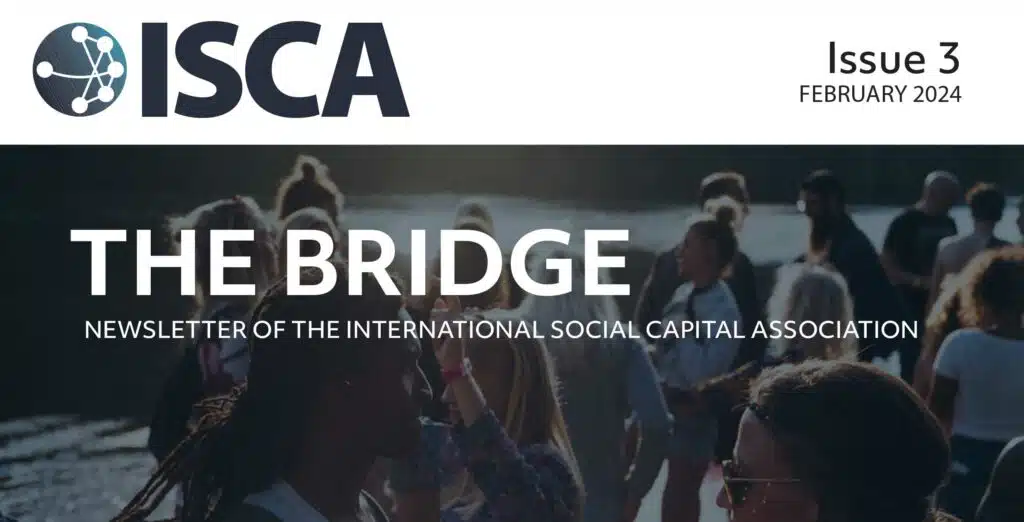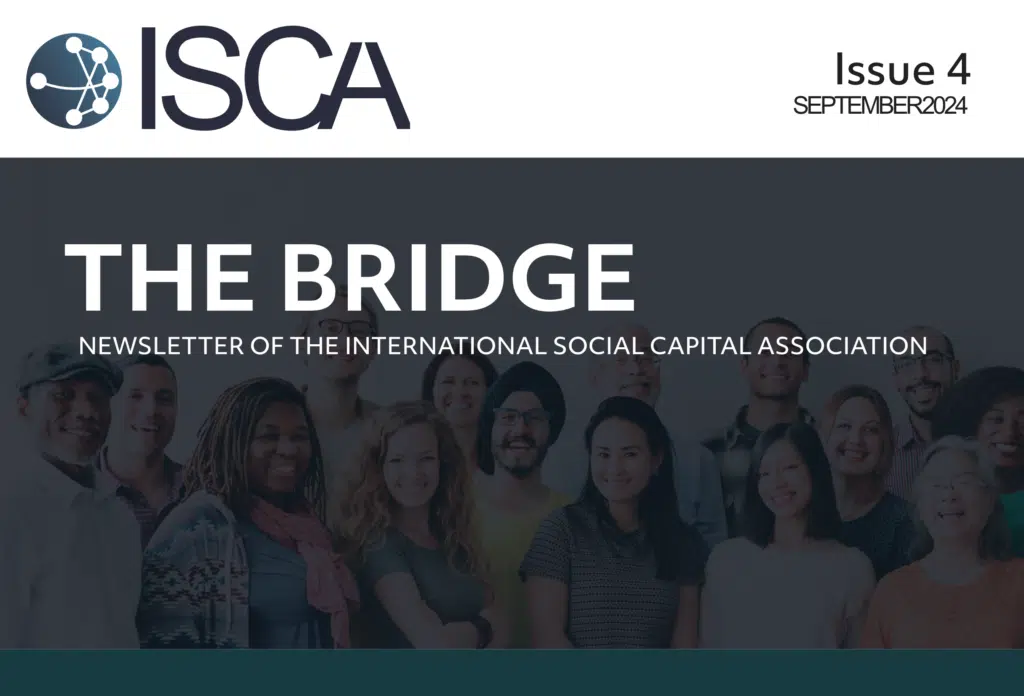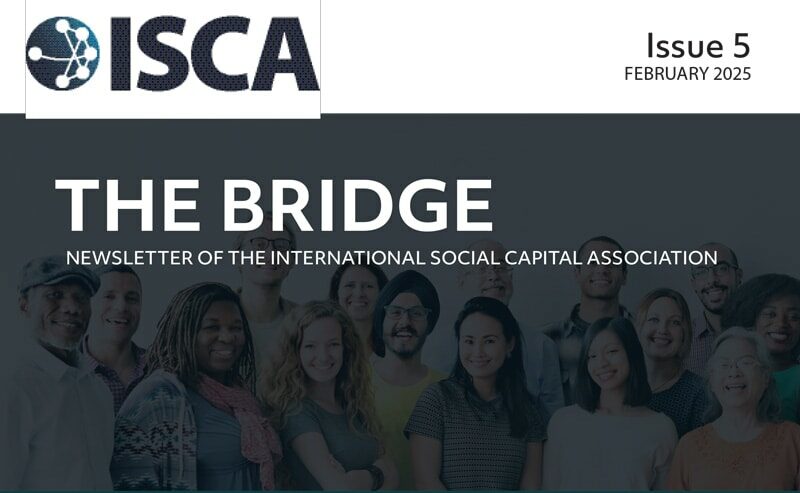Welcome
Dear Esteemed Members and Colleagues,
Welcome to the latest edition of The Bridge – Newsletter of the International Social Capital Association. As we embark on this journey of knowledge exchange and scholarly discourse, we are delighted to bring you a curated collection of insights, updates, and accomplishments that reflect the vibrant spirit of our academic community.
This edition will feature a review of some current research in the field, make you aware of the vast trove of content on our website, describe some ways that you can engage with the association and share some examples of social capital at work in our everyday world. As we come together to celebrate our shared passion for learning and discovery, we invite you to immerse yourself in the diverse perspectives, applications, and contributions to the field of social capital and our association.
We extend our appreciation to each and every member whose dedication and enthusiasm continue to shape the International Social Capital Association (ISCA). Your invaluable support fuels our mission to create a platform where ideas and connections flourish.
Download a PDF of this newsletter
Recent Social Capital Research
As a versatile cornerstone of academic inquiry, social capital theory transcends disciplinary boundaries, casting its influence across a multitude of realms.
Over the past year, there have been many fascinating papers published that are grounded in social capital theory. In a paper published by scholars at the Universitas Padjadjaran in Indonesia, social capital was demonstrated to be the catalyst for women in low-income families to rise to the role of primary breadwinner. In this scenario, social capital had been built within assistance programs designed to empower women to go into business (Ashmad et al 2022). Scholars at Saint Leo University in the United States identified the role of cultural and techno-capital in the building of academic social capital by adult learners in online higher education degree programs. (Hamilton et al 2023).
In the realm of business, a study by Taylor (University of Manitoba, Candada) and Rosca (University of Groningen, the Netherlands) looked at the practice of leveraging social capital within networks of social enterprises to achieve business goals related to impact and viability (2023). Finally in a study on youth addiction to Facebook, scholars from the University of Hong Kong and the University of Tsukuba in Tokyo discovered that youth with the strongest addiction to Facebook also expressed a perception of low cognitive social capital. The researchers also looked at the impact on bonding social capital and found a lower but still significant relationship. The most negative outcome of addiction on perceived social capital was with the female participants in the study (Wong et al 2023)
Achmad, W., Nurwati, N., Fedryansyah, M., Sumadinata, S. R. W. (2022). Women’s Social Capital for Empowering Poor Households. International Journal of Artificial Intelligence Research. https://doi.org/10.29099/ijair.v6i1.395
Hamilton, W., Duerr, D. E., Hemphill, C., Colello, K. (2023). Techno-capital, cultural capital, and the cultivation of academic social capital: The case of adult online college students. The Internet and Higher Education, 56, https://doi.org/10.1016/j.iheduc.2022.100891
Taylor, K. M., & Rosca, E. (2023). Sink, swim, or drift: How social enterprises use supply chain social capital to balance tensions between impact and viability. Journal of Supply Chain Management, 59(2), 62–86. https://doi.org/10.1111/jscm.12295
Wong, J., Ho, K.K.W., Leung, T.N. and Chiu, D.K.W. (2023), “Exploring the associations of youth Facebook addiction with social capital perceptions”, Online Information Review, Vol. 47 No. 2, pp. 283-298. https://doi.org/10.1108/OIR-06-2021-0300
Social Capital Webinar Series
Since April 2020, our Social Capital Webinar Series has been a platform for intellectual exploration, bringing together scholars, professionals, and thought leaders from diverse academic disciplines and industries. The archive of past webinars can be found at this link.
As we continue this inspiring journey, we invite you to be a part of this program and contribute to the vibrant discourse on social capital.
Previous speakers include luminaries such as Robert Putnam, Eric Uslander, Lindon Robison and Daniel Aldrich who have graciously shared their profound insights and expertise – as well as scholars and professionals from across the globe. As we celebrate this remarkable legacy, we also extend an invitation to you.
Have you been immersed in research or innovative practices that harness the power of social capital theory? Then come take center stage and present your ideas to a captivated audience.
For those of you interested in presenting a talk about your scholarship or practice that leverages social capital theory, please submit a presentation proposal at this link. These virtual events provide a platform for you to expand the reach of your research and work and contribute to the knowledge and application of social capital across disciplines and careers.
Get Involved
Are you ready to be a catalyst for change and contribute to a thriving community? The International Social Capital Association invites you to become an integral part of our mission through volunteering.
Share Your Wisdom: Be a webinar presenter and share your expertise with a global audience, igniting discussions that shape the future.
Commit to Excellence: Join a committee that drives innovation and influences our direction, ensuring our impact echoes across disciplines and industries.
Lead the Way: Consider board service to guide our vision, shaping our path towards a brighter tomorrow.
Unlock Knowledge: Sign up for membership and access a wealth of resources, connections and opportunities.
Connect and Collaborate: Engage in our vibrant Mighty Networks platform, where ideas converge, and relationships flourish.
Ready to engage, contribute and inspire? Contact us at this link, and let’s take this impactful journey together.
Annual General Meeting (AGM)
ISCA’s 2023 Annual General Meeting (AGM) is scheduled for September 6th, 2023. All members are encouraged to attend and engage in vital decisions. The AGM, held online in two sessions 12 hours apart, aims to ensure global participation. Your input is crucial for ISCA’s growth, including electing new Directors.
Agenda highlights:
- President’s and Financial Reports
- Election of office holders and board positions
- Membership fees
- Motions and general business
Details to join the online sessions will be sent to members ahead of the event with a Zoom link. In the meantime, save the date:
- Session 1 – Sept 6, 7am UTC
- Session 2 – Sept 6, 7pm UTC
ISCA Mighty Network
Exciting news! We are happy to introduce our Might Networks community exclusively for ISCA members. Connect, learn, and collaborate with each other, share insights, and access resources. Join today and explore the focused interest groups. Let’s build a thriving social capital community together!
To join the community, either download the Mighty Networks app and request to join International Social Capital Association or visit https://intsocialcapital.mn.co/ and request to join. Please note: Our Mighty Networks community is only available to current ISCA members.
Stay updated with what’s happening in our Social Capital Community
Mighty Networks has some great options for keeping up to date with what is happening in our social capital community. The best way to get notifications is to download the Mighty Networks app on your phone so you can receive notifications wherever you are.
You can adjust the settings to receive the notifications that are of interest to you.
To adjust the notification settings, go to your profile in Mighty Networks and click Notifications. You can set it to receive email updates and select the frequency. You can also select to receive Mobile Push notifications and you can customize a wide range of notification types.





I am more interested in understanding the concept of social capital and how the social capital theory can be used to bolster educational policies, strategies, curriculum and interventions.